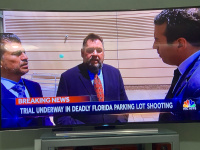 Largo Criminal Lawyers, Florida
Largo Criminal Lawyers, Florida
Sponsored Law Firm
-
 x
x

Click For More Info:
-
Joseph A. Gasparro, PA
813 Jackson Rd Jacksonville, FL 32225» view mapCriminal Defense Law Serving the Best Interests Of Our Clients
When you need accurate representation for criminal defense issues, Joseph Gasparro is there for you.
800-971-8621
Sponsored Lawyers
1-10 of 46 matches
Civil Rights, Juvenile Law, Federal Appellate Practice, Domestic Violence & Neglect
Trevena, Pontrello & Associates offers legal representation in the areas of criminal defense, criminal appeals, and some civil and family law matters. As a Board Certified Criminal Trial Lawyer with over 30 years of litigation and practice experience, John Trevena offers sophisticated and ingenious strategies for what can often be complex and difficult circumstances. John H. Trevena is the owner and managing attorney of his firm. His keen sense of strategy, accomplished skills as a trial lawyer and straightforward approach bring due process for his clients in the criminal justice and civil court systems. Attorney Trevena is listed in Florida Super Lawyers magazine in 2006, 2007, 2008, and 2009. Super Lawyers are peer selected and considered among the top 5% of attorneys in their areas of practice. Attorney Trevena is also a Fellow of the Litigation Counsel of America (LCA). The LCA is comprised of less than one-half of one percent of American lawyers. Membership is limited by invitation only and selection is based upon evaluations of effectiveness and accomplishment in litigation, and superior ethical reputation. Attorney Trevena is ranked ranked Superb (10 out of 10) by Avvo™, an independent company that ranks attorneys based on their years in practice, disciplinary history, professional achievements, and industry recognition. Trevena's firm was also recently named the Criminal Law Firm of the Year - Florida, by the publication Corporate America - The Legal Elite 2015. Attorney Trevena is a member of The American Trial Lawyers Association (The Association) and was selected for inclusion in the Top 100 Trial Lawyers for the State of Florida (2007-2015). Membership into The American Trial Lawyers Association is by invitation and is extended only to those attorneys who exemplify superior qualifications, trial results, leadership, influence, reputation, stature, and profile in the trial attorney community, as viewed by The Association, other trial lawyers, members of the bench, and the public at large. Attorney Trevena was also elected as a Fellow of the American Bar Foundation in 2010. The Fellows of the American Bar Foundation is an honorary organization representing one-third of one percent of licensed attorneys. Fellows are lawyers, judges, law faculty, and legal scholars who have been elected by their peers to become members of The Fellows because of their outstanding achievements in the legal profession. Attorney Trevena was admitted to the Florida Bar and US District Court, Middle District of Florida in 1986. He received his Juris Doctor from Stetson University in 1985, and his Bachelor of Arts degree in 1982 from the University of South Florida. His current memberships include: Clearwater, St. Petersburg and American (Member, Criminal Law Section) Bar Associations The Florida Bar; the Florida Association of Criminal Defense Lawyers (Life Member) Pinellas County Trial Lawyers Association (President, 2005) Pinellas County Criminal Defense Lawyers Association National Association of Criminal Defense Lawyers (Life Member) American Judicature Society. John is a Lifetime Member of Phi Delta Phi, and was on the editorial board for the Florida Bar Journal and Florida Bar News from 1990-1993. He served as Assistant State Attorney from 1985-1987. Attorney Trevena has been a Board Certified Criminal Trial Lawyer (Florida Bar Board of Legal Specialization and Education) since August 1, 1992.
(more)Accident & Injury, Federal Appellate Practice, Criminal, DUI-DWI
Attorney Bridgette Michelle Lester is compassionate, competent and centered around your legal needs. Whether it be a criminal matter, personal injury or small business related, Attorney Lester is here to guide you throughout the process while getting it the best results for you. She is the immediate past President of the Fred G. Minnis, Sr. Bar Association, which is the largest predominantly African American bar Association in the county and one of the fastest growing. She served 2 terms as President and currently sits on the Board. About Attorney Bridgette Michelle: Bridgette Michelle was raised in a military home where she she saw the sacrifice of our men and women in uniform each day. Through her father's service to our great country she was afforded the opportunity to travel many parts of the world, and led to her graduating in Italy. Prior to becoming an Attorney, she set her sights on education. She became an Educator with Pinellas County Schools in the fall of 2008. She taught the award winning Broadcast Journalism program at Thurgood Marshall Fundamental Middle School and served as a mentor for the Girlfriends program and started the schools first ever debate team. While being an Educator she also attended the part-time program at Stetson University College of Law. She was recognized in "Who's Who in American Law Schools and Universities," earned a scholarship from the Fred G.Minnis Sr. Bar Association and was honored as a Daniel Burton scholar. Additionally, she served as a Law clerk for Tamara Felton, P.A. and as a judicial intern for the Sixth Judicial Circuit before she became an Assistant Public Defender. While working in that capacity she earned the coveted, "We Are the Hope," award and "Best Advocate," at the state wide training session. Attorney Bridgette Michelle further honed her skills by working for a prominent law firm in the Tampa Bay Area. There, she was able to work on several high profile cases, many of which made national news. Most recently she's been recognized by the National Black Lawyers Top 40 Under 40, SuperLawyers Rising Star 2017, Top Rated Attorney by Avvo for a perfect 10 rating while also receiving the Clients Choice Award. She still finds time to be actively give back through her volunteer effortd with Pinellas county schools, church and her community.
(more)Criminal, Bankruptcy & Debt, Accident & Injury, Business
Stephen Bernhardt has been an attorney since he was 25 years old. Now, nearly a decade later, Bernhardt has extensive trial experience in both criminal and civil law. He began his legal career as a prosecutor, first handling misdemeanor offenses such as DUI, Battery, Possession of Controlled Substance, Violation of Injunction and many others. Bernhardt was quickly moved to a felony division and become the State Attorney’s Office’s representative for the county’s Drug Court Program. In this role, Bernhardt learned many techniques to help individuals overcome addictions as well as the differences between the many rehabilitation establishments throughout Florida. Prior to leaving the State Attorney’s Office, Bernhardt was the lead prosecutor in his division. Bernhardt conducted several jury trials that ended in convictions and sentences of more than thirty years, including a mandatory life in prison sentence. After leaving the State Attorney’s Office, Bernhardt began practicing civil law for one of the largest creditors’ rights firms in the United States. Bernhardt quickly became the lead litigating attorney for the firm’s Florida office and handled countless civil hearings and trials before leaving to start Bernhardt Law, PLLC. Bernhardt Law focuses on the practice areas of Criminal Defense, Personal Injury and Debt Defense. Using the knowledge gained throughout the years, Bernhardt Law is dedicated to making sure each client’s specific situation is handled with the utmost professionalism, attention to detail, and integrity.
(more)Accident & Injury, Personal Injury, Car Accident, Criminal, DUI-DWI
Daniel Hartpence was born and raised in Fayetteville, Georgia. As the son of a chiropractor and teacher, he was instilled with the drive and motivation necessary to succeed and excel. He went to Starr's Mill High School, then on to Eckerd College in St. Petersburg, Florida. At Eckerd, Daniel played baseball and earned a Bachelor of Science degree in Biochemistry and a minor in Classic History.
(more)



 Joseph Gasparro Jacksonville, FL
Joseph Gasparro Jacksonville, FL AboutJoseph A. Gasparro, PA
AboutJoseph A. Gasparro, PA Practice AreasExpertise
Practice AreasExpertise




